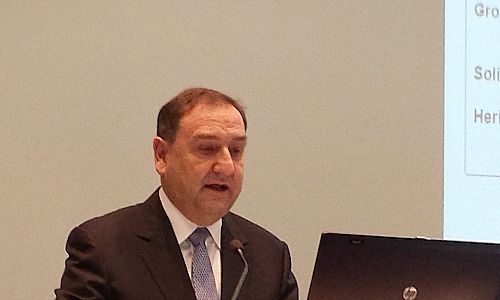The merger of EFG International and BSI is a challenging undertaking. Seven questions that arise and answers provided by EFG boss Joachim Straehle, the driving force behind the deal.
1. Possible Implications From Malaysia Scandal?
A BSI banker in Singapore seems to have played a central role in the affaire about the 1MDB Malaysian state fund. A potential fine of as much as $1 billion would badly hurt EFG. Joachim Straehle today said that the bank had taken all possible precautions.
The precautions taken are said to be a «substantial» amount paid into an account set up for the purpose only. The amount would be deducted from the purchase price in case of a fine. But whether this amount is enough to cover for the fine remains to be seen. If the U.S. judiciary decides to get involved, the fall out could become very expensive indeed.
2. A Clash of Cultures?
EFG advisers are known to enjoy far-reaching liberties and act pretty much as entrepreneurs within their bank. To talk about a clash of cultures was «exaggerated», Straehle said. A strong sense of entrepreneurial spirit was a trademark of both companies, he added, and now it was important to take the best from both sides.
Evidently, both BSI and EFG bankers have to make compromises. «We have to be fair to all of them,» said the CEO of EFG. The total compensation in some instances might decline – and depending on how much, EFG employees might not like it too much. Their wages reportedly are substantially higher than the ones BSI pays its bankers.
3. The Future Role of BSI CEO Stefano Coduri?
The new structure of the management will be made public after the conclusion of the merger – probably in the fourth quarter of 2016. Straehle repeatedly stressed that this was a merger and not a takeover. Two posts have been filled already: Straehle is the CEO of the combined company and Giorgio Pradelli his deputy and CFO.
Stefano Coduri, who was present at the press conference, said he was happy to be here. But it wouldn't come as much of a surprise if Coduri left sooner rather than later being the No. 3 behind Straehle and Pradelli.
4. How Many Jobs Will Be Cut?
Straehle didn't want to be drawn on how many positions he would pare. EFG at the end of 2015 already announced it will cut 200 jobs.
Both sides will need to reduce their workforce, because the cost-income-ratio at BSI is 80 percent and at EFG as much as 86 percent. Predalli called both figures «disappointing». Obviously, both institutes will have to present new cost cuts soon.
5. What About the New Name?
EFG/BSI. BSI will remain the brand used in the Ticino region, its home. «We will think about a rebranding in about two years time,» said Straehle. Zurich will remain the location of the headquarters and the bank will retain is listing on the SIX Swiss exchange.
6. Is EFG/BSI Big Enough?
«I hope so,» was Straehle's answer. Before the bank can think about further acquisitions, it will have to bring the BSI-acquisition to a successful conclusion.
EFG/BSI becomes the new No. 5 in Switzerland. In Asia, the banks have a combined 27 billion, making them a small fish in a big pond – and equally so in Latin America, where the two have 20 billion francs in assets under management.
To make the company profitable on a long-term basis, the size won't suffice.
7. Which Are EFG/BSI's Growth Markets?
The main reason for the takeover was the strength of BSI in Switzerland. EFG hasn't so far been present in the Italian-speaking part of Switzerland. BSI is furthermore active in Italy, a market EFG hasn't covered so far.
But the Swiss market is well covered by a great many players. Growth will only be achievable by aggressively poaching client advisers and low margins.


































